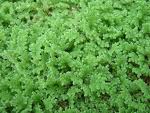There is an innovative way of eradicating heavy metals pollutants in the environment as developed by Israeli scientists.
A team of botanists headed by Prof. Elisha Tel-Or at the Hebrew University in Israel, have successfully utilized water plants like the frail looking but clearly healthy Azolla ferns and water lilies to absorb heavy metals without a detrimental effect to the plants themselves.
Azolla plants have long life and will absorb copper, cadmium, zinc, chromium and nickel at 500 times their concentration in common sewage or liquefied industrial wastes. The important attribute of Azolla is that it can be used as biofilter rather than just an ornamental plant.
This bio-filter can be planted anywhere and can ideally be propagated close to the source of potential pollutant. It can be best effective if it treats a targeted one kind of heavy metal instead of various compounds.
The Azolla plant as biofilter has been tested in a number of industrial settings in Israel such as a nickel cadmium battery plant; a lead car battery factory; and a plant facility using chromium.
The same also proved effective in reclaiming gold in jewelry making establishment. Not only can the fern prevent pollution but when the Azolla is burned its ‘naturally enriched ash’ contains 6% gold and 4% platinum which can be retrieved.
Another potential use for Azolla bio-filters is to strain out radioactive materials. Tests on radioactive uranium tracing solutions originating in a nuclear research facility were 99% purified after being passed through an Azolla bio filter.
The process is expected to significantly reduced the volume of radioactive wastes that must be stored. In addition to, radioactive isotopes can be recovered and ‘recycled’ in this procedure.
Aside from the water plant Azolla, Prof. Tel-Or has also discovered that water lilies (Nymphaea variety) are endowed with anatomical and physiological traits that allow them to literally thrive on water with high concentration of heavy metals such as cadmium, mercury, nickel and cobalt.
Under laboratory conditions, the water plant proved capable of absorbing metals at a rate of 16% of its dry weight. A pilot project at Haifa Municipal Waste Water Treatment Plant is being tapped, aims to evaluate the water lily’s other potential in an industrial setting.

